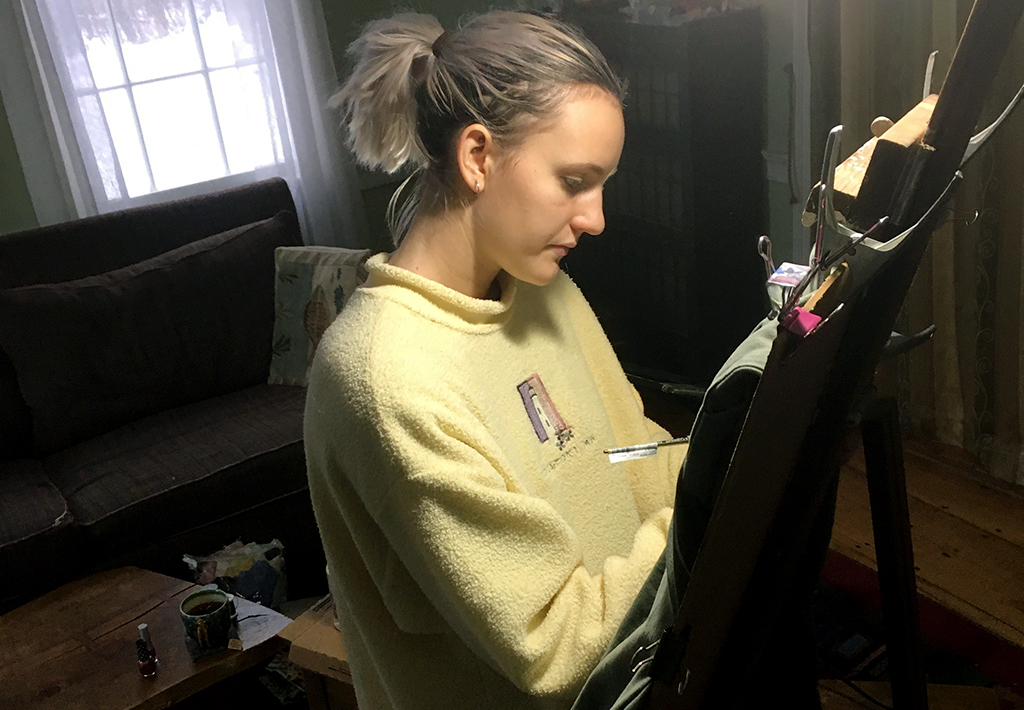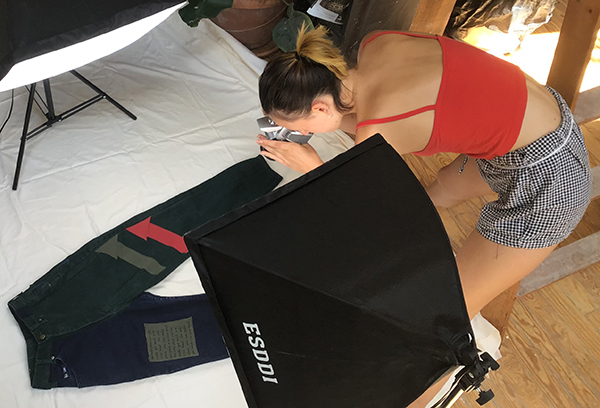Lilah Feitner ’22 is tailoring her ‘upcycled’ future

Lilah Feitner ’22 has been sewing regularly since she was 7 years old, but when the COVID-19 pandemic hit, she decided to turn her hobby into a full-time venture.
Feitner applied for funding through a LEEP fellowship grant and began upcycling clothing this spring — taking old garments and transforming them into new pieces. At the end of August, she launched a genderless clothing brand, Spinout Apparel, along with a podcast, “The Upcycled Mentality,” which explores sustainability within the fashion industry.
“The sustainability part of it has always been natural for me because I grew up thrifting a lot and never felt the need to spend money on new material,” Feitner says. “All of this clothing that I made, I wanted to ensure that I was marketing it directly as it is — clothing that is not limited by traditional male and female gender.”
A media, culture, and the arts and studio art double major at Clark University, Feitner says the project allowed her to combine many of her interests, including fashion, art, sustainability, and media. She is currently taking the fall semester off to complete an internship with Becket, Mass.-based artist Crispina ffrench, an environmentalist and screen printer who has been upcycling textiles since the 1980s.
“Crispina gave me a really big scope in terms of sustainability in fashion because part of her job is working with large-volume textile waste producers — companies like Patagonia, Eileen Fisher, and Timberland — and helping them restructure their businesses to be sustainable and to reclaim their scrap,” Feitner says. “That gave me a huge insight into not only the singular artists that are doing this, but also the work being done at major corporations.”

Feitner’s first clothing release, the Splice Collection, launched on Aug. 24. It features a color block theme with the slogan “this way out” printed on each piece, accompanied by an arrow pointing upward. Feitner says the design serves as a reminder that you have control of your own reality — the only place you can get stuck is in your head.
When it came to designing the collection, Feitner drew inspiration from the artists she interviewed for her podcast. “A lot of them are at different points in their development as artists and designers, and their work is incredibility inspirational,” she says. “One of the cool things about upcycled clothing is that it’s always unique.”
The Splice Collection consists of 18 pieces, including shirts, sweaters, sweatshirts, and pants, that Feitner designed to dissolve the boundaries of gendered clothing — a characteristic she wanted to bring to the forefront of her brand.
Feitner is currently donating all proceeds from Spinout Apparel’s face mask sales to the Navajo Nation’s COVID-19 Relief Fund. And at the start of the pandemic, she began sewing face masks with leftover material and donated 80 masks to the Navajo Nation and Pyramid Lake Paiute Reservation.
“I wanted to incorporate a fundraising component. Especially at the beginning, when I was doing a call-out for fabric donations, there wasn’t a lot of access to masks,” she says. “I decided that any additional material I didn’t use in the project would go toward making masks. COVID-19 was hitting those areas hard, and the government wasn’t doing anything to help with relief.”
Education is also an important aspect of Feitner’s work.
She recorded and produced three podcast episodes with the goal of increasing awareness about sustainability within the fashion industry, and intends to produce three more as part of her project. Through the process, Feitner has interviewed multiple artists, talking in depth about different aspects of upcycling.
“Initially, I was trying to figure out how to make the project more than just creating something. I knew I wanted to create a cohesive collection, but I also realized I should include some kind of education around what I’m doing,” she says. “I decided to add a research component, and from there I got the idea of a podcast.”
Feitner learned how to edit audio through a radio journalism course she took at Clark last fall, and for extra assistance she reached out to alumna Liza French ’19, who created a podcast called “Namesake” for her honors thesis. French gave Feitner advice on what technology to use and how best to frame her podcast, and Feitner figured the rest out by trial and error. When she needed music and cover art, she reached out to other friends in the Clark community.
“Everybody was super helpful and willing,” she says. “I also got a lot of guidance from my adviser, studio art professor Elli Crocker. She was great throughout this whole process and helped me stay motivated and gave me advice. For an artist selling work for the first time, it’s pretty nerve-wracking, and she was very supportive of what I was creating and helpful at those sticking points.”
One of Feitner’s goals for her next collection, which will likely launch around December, is to offer a wider range of clothing sizes. She also plans to incorporate more accessories into the collection, including belts made from recycled car seat belts.
After graduating from Clark, Feitner plans to attend graduate school to study sustainability and eco-friendly fashion. Her ultimate goal is to spark change within the industry.
“When I returned to this hobby I’d been doing for so long, I realized there was a reason I’ve been consistently sewing since I was 7. It made me realize sustainability and fashion is a path I can see myself working in in the future,” she says. “One of my dreams is to become involved with a celebrity brand. If you can get in at that high level and get them to upcycle and be sustainable, that affects their entire fan base, what’s popular in fashion, and what people are going to try to replicate.”


